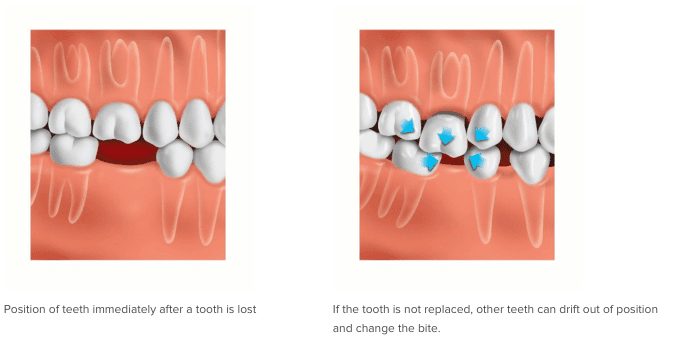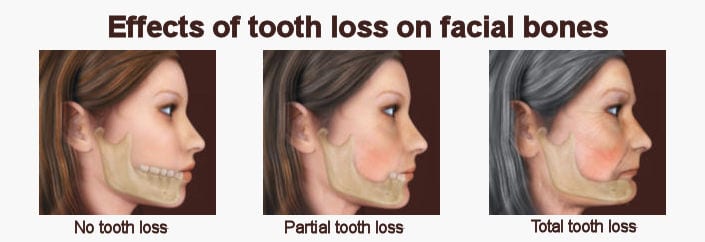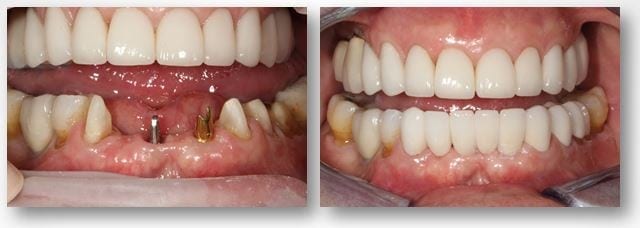Have you just lost a tooth? Do you have multiple missing teeth that make it hard to eat the foods you love? Dr. Conover, an award-winning dentist in Philadelphia, PA, has replaced countless lost and missing teeth for patients of all ages.
“You know Doc, it’s just a back tooth. No one will see it, so I’ll just get rid of it. It’s not going to make a difference.” Unfortunately, this is a frequent statement our dental care team hears from patients. Missing teeth are one of the most common dental concerns patients face.
The truth is, though, it WILL make a difference. Losing a single tooth can set a course that leads to destroying an entire mouth.
Reasons to Replace Missing Teeth in Philadelphia, PA
Losing a tooth, especially in the front of your mouth, can make you feel self-conscious about your smile. You may hide your teeth in social situations if you have missing teeth. In addition to cosmetic concerns, you may want to replace your missing teeth for other reasons.
Alignment of Teeth

When you lose a tooth, the nearby teeth start to shift into the empty space. Over time, other teeth will also move out of place, trying to fill the gap. As this shifting continues, it can change the way your teeth line up, making them crooked or uneven. This can affect how your smile looks and make it harder to chew food properly. It can even cause problems with speaking clearly. Keeping your teeth in the right position is essential for your appearance and your overall dental health.
Bone Loss

Your teeth play a significant role in keeping the bones in your jaw and face strong. They help maintain the shape and structure of your mouth. When you lose a tooth, the bone in that area no longer has the support it needs and begins to shrink. Over time, this bone loss can become severe. It can weaken the foundation for the nearby teeth.
If you do not replace a missing tooth, the surrounding teeth may become loose or shift out of place. This can lead to changes in your bite, problems with chewing, and even changes in the shape of your face.
Treatment Options for Missing Teeth

Dental Implants
Dental implants are surgically placed in the upper or lower jaw to replace missing teeth. They look and feel like natural teeth. The implant helps stabilize the jaw and does not affect healthy, surrounding teeth. Dental implants are an optimal solution for missing teeth made of titanium or other materials compatible with the human body. They have a success rate of over 95%.
We can replace a single tooth with a crown or support bridges and dentures with implants.
Dental Bridges
We can replace one or more multiple consecutive teeth with dental bridges. Traditional dental bridges use the support of adjacent natural teeth. When you get these bridges, a dentist will place crowns on the neighboring teeth to hold the bridge in place. However, with implant bridges, you do not need to prepare your natural teeth to support the bridge. It offers a healthier long-term option.

Example of an implant-supported bridge to replace multiple missing teeth.

Dentures
Full or partial dentures are more natural-looking and feeling than ever before. When a patient is missing several teeth, dentures have the same look as natural teeth, allowing patients to chew, speak, and smile normally. Full dentures replace all upper or lower teeth and can be fixed or removable. Fixed dentures attach to the gums through dental implants. They offer long-term benefits and require maintenance similar to natural teeth.
We use partial dentures when one or more natural teeth remain in the upper or lower jaw and prevent the remaining teeth from changing positions. Like full dentures, partial dentures may also be fixed or removable.
Dr. Conover also provides All-on-Four. This treatment uses as few as four implants to replace an entire tooth arch.

Missing Teeth FAQs
Learn more about missing teeth in Philadelphia, PA, with answers to these common questions.
How long does it take to replace a missing tooth?
The time it takes to replace a missing tooth depends on the treatment you choose. If you get a dental implant, the entire process usually takes between three and six months. If you need pretreatments like gum disease, bone grafting, or tooth extraction, it can add to your total treatment time.
While implant treatment can take longer than getting traditional bridges or dentures, implants last longer.
What happens if you don’t replace a missing tooth?
If you don’t replace a missing tooth, it can cause several problems over time. The teeth next to the empty space may start to shift, moving out of their normal position. This can make your teeth crooked and affect your bite, making it harder to chew food properly.
Another problem is bone loss. Your teeth help keep your jawbone strong, but when a tooth is missing, the bone in that area begins to shrink. Over time, this can change the shape of your face, making it look sunken or aged.
Missing teeth can also make it harder to speak clearly, especially if the gap is in a visible area. Plus, if you have several missing teeth, it can put extra stress on the remaining ones, leading to more wear and tear.
Does losing teeth change your face shape?
When teeth begin to move around, it can alter the structure of your jaw and how it fits together. After some time, your jawline will gradually decline, and the facial muscles will no longer be able to support your face, leading to a collapsed look. This alters the shape of your jaw and makes you look older.
Schedule a Dental Exam and Missing Teeth Consultation Today
Dr. Derek Conover has training and experience in implant dentistry. He is pleased to offer state-of-the-art implant treatment to patients with missing teeth.
If you or anyone you know might benefit from dental implant treatment or would like more information, please call our office at (215) 395-6076. You can also contact us online.
